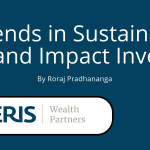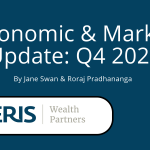2016: What’s On Our Mind
By Patricia Farrar-Rivas, CEO
2016 is already off and running fast.
Early each year, to make sure we’re focused on our investment themes, our team takes time to re-affirm our priorities so we can, in turn, help clients achieve their goals.
So what are those priorities? As a firm, Veris remains committed to developing the following impact and sustainable investing strategies:
- Investments to counter climate change and create environmentally sound and socially just solutions
- Gender Lens Investing, which focuses on investing in companies with women in leadership, with corporate cultures where women can advance, and in product and services supporting women and girls
- Community Wealth Building to renew vulnerable communities
- Sustainable agriculture and food systems
- Mindfulness and sustainability
To provide some fresh thinking about each of these strategies, I wanted to share a number of enlightening points-of-view. They are from various media – books, newspapers, magazines, as well as a podcast. They are all terrific food for thought. So here goes.
Should We Be Scared Of Immigrants?
The Syrian refugee crisis in Europe and the inflammatory rhetoric of the Presidential campaign have completely polarized the debate about immigration. In the current environment, immigration – both legal and illegal – has become another issue that divides us.
It doesn’t need to be that way, if only common sense entered the conversation. That’s exactly what Freakonomics author Stephen J. Dubner did in his wonderful, hour-long podcast, Is Migration a Basic Human Right?
I loved this podcast because it reminds all of us about enormous benefits of immigration. One of the reasons the U.S. is so successful is that our country was built by a diverse group of cultures.
Dubner goes into the history of why immigration is a strength. He also makes another critical, if little-mentioned point: Migration is part of the human condition. Humanity has been in a constant state of migration ever since we learned to walk on two legs. This podcast injects rationality back into the whole overheated issue.
The Radical Women We Love
Rad American Women A-Z by Kate Schatz is one of those books you just want to tell others about. Written for children, it profiles a list of pioneering women who have changed history. It features some of the most well-known – and least well-known – women of the past few hundred years.
The women are of different races, backgrounds, and professions, but all are role models with a fascinating story. I personally like the journey of Angelina and Sarah Grimke. These two sisters from South Carolina devoted their lives to ending slavery in the 1830s. They pushed the boundaries of what was then considered acceptable roles for women in public matters and remain inspirational figures 185 years later.
The book also includes Angela Davis, Billie Jean King, Carol Burnett, Rachel Carson, and Patti Smith, among others. The book goes in alphabetical order, and I particularly liked how the letter X was handled. It was a dedication to all those women who are to come and change the world.
But perhaps the best reason I latched onto this book: My six-year-old granddaughter was enthralled by it. She especially liked the full-page illustrations of each of woman.
Combatting Climate Change
The climate change summit in November seized the world’s attention about one of the gravest threats humanity faces. As you probably saw, much was said and written about the proceedings.
In fact, it was overwhelming. That’s why I’d recommend two very informative pieces. The first is a recap of the summit’s highlights, written by the BBC. This story summarizes what was achieved and what wasn’t. It also put those achievements in context with the progress made at the Kyoto Summit in 1997. If you’re looking for an overview to help understand what happened, this is it.
A second piece that provides greater depth is The Economist’s 36-page special report on climate change published just before the global confab. With the Economist’s usual lucid prose and cleared-eyed analysis, the report laid out the key climate change issues. It’s a reference you can return to again and again.
Black Lives Matter
In too many communities in our country, people of color are disproportionately faced with limited options for education, health care, housing, jobs, and healthy food. Decades of poverty and institutionalized marginalization have cut families off from opportunities to create healthy communities.
With this as a backdrop, I was truly moved by Between The World And Me, by Ta-Nehisi Coates. Like The Fire Next Time, the 1963 classic written by James Baldwin that inspired Coates, this book is a very moving and personal piece of work.
A No. 1 New York Times best seller, Between the World and Me is the story of an African-American father writing a letter to his teenage son explaining racism in America. To hear the intimate voice of an African-American man talking to his son in the midst of a national epidemic of violence and injustice against young black men is something everyone needs to experience.
Coates sets the stage by explaining the historical evolution of racism in this country. It includes how slaves were dehumanized when they were brought to America and then puts everything into perspective right up to Ferguson, Trayvon Martin, and South Carolina. His writing is all of the more gripping because of he grew up in a poor black neighborhood.
Coates’ story reminded me of another outstanding book, The New Jim Crow: Mass Incarceration in the Age of Colorblindness. The author is Michelle Alexander, Associate Professor at Ohio State University and a civil rights attorney. With lawyerly precision, Alexander makes a strong case about why we should all be outraged by the war on drugs. She points out that even though the vast majority of drug dealers and users are white, the percentage of incarcerated African Americans is 7 to 10 times higher than that of white Americans. This is another must-read.
Sustainable Agriculture For All
One of the starting points for public health is a sound and affordable food supply. Yet, for too many Americans, the choices are limited and fast food is all too abundant. Now, in some places across the country, cities are experimenting with new ways to grow and distribute food to improve public health.
Fixing Food is a very well done analysis by Union of Concerned Scientists. This 20-page report describes the efforts under way in five cities – Oakland, Memphis, Louisville, Baltimore and Minneapolis – to increase the number healthy food options.
Of note is the report’s discussion about how many local governments and community leaders are focused on healthy food initiatives for lower-income communities and communities of color. Research shows that these communities are more likely to suffer from diet-related illnesses, such as diabetes and cardiovascular disease. This is a highly informative report that deserves to be shared.
Intuition and Our Biases
Thinking, Fast and Slow, by Nobel Prize winner Daniel Kahneman, should be required for anyone living in our times. This New York Times best seller synthesizes the seminal work of one of the most important psychologists of our time.
The book explains two types of thinking we all engage in whether we know it or not. The first is the snap judgments and involuntary conclusions we make based on intuition and experience – fast thinking. The second is slower and more careful thinking that requires us to stop what we are doing and focus.
The first kind of thinking is a product of our evolution. We made quick decisions because our life depended on it when we lived on the savannah. As good as those instincts are today, they also have built in blind-spots we don’t experience as biases, but are biases just the same. Slow thinking is essential to make sense of the world around us and offer a counter-balance to our reflexive judgments and thinking.
Kahneman implores us to examine our own social biases, and also shows us how to understand our consciousness. It’s an eye-opening book that demonstrates just how much we don’t know about our own motivation and the way we think.
* * *
I hope these recommendations provoke some critical thinking and enlightenment for you. Please feel free to share these points-of-view with others.







